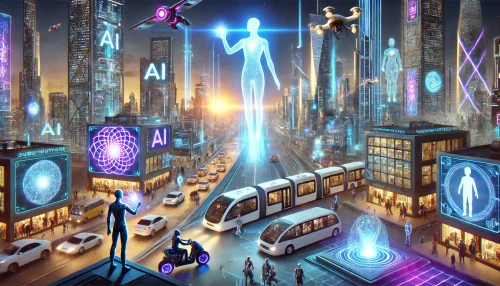AI Generated Post About The Future of AI! :)
Artificial intelligence (AI) is evolving at an unprecedented pace, transforming industries and reshaping the way we live and work. But what does the future hold for AI?
Picture a sprawling futuristic cityscape bathed in neon lights, where AI-powered robots and humans coexist harmoniously. Towering skyscrapers are intertwined with luminous circuits, and autonomous vehicles glide through the air alongside holographic displays. This image captures the essence of the future of AI—a world where technology amplifies human potential in unimaginable ways.
Speaking of the future, have you ever thought about how AI might transform fields like medicine or environmental sustainability? The possibilities are pretty exciting!
The atmosphere hums with innovation as AI optimizes energy use, making the entire city sustainable and eco-friendly. Education is personalized, with AI tutors crafting learning experiences tailored to each individual’s passions and strengths. Healthcare has been revolutionized, predicting and preventing illnesses before symptoms even appear.
Thinking about this vision, it’s fascinating to consider how AI could transform not just technology, but the very fabric of society. Are there any particular innovations or changes you’re excited to see in the future of AI?
1. More Human-Like AI
Advancements in natural language processing and machine learning will make AI more intuitive and capable of human-like reasoning. Expect AI to engage in deeper, more meaningful conversations and assist in complex decision-making.
2. AI in Everyday Life
From smart assistants to self-driving cars, AI will become even more embedded in daily activities. AI-powered personal assistants will not just respond to commands but anticipate needs, optimizing everything from schedules to shopping habits.
3. The Ethical Challenge
As AI grows more powerful, ethical concerns around bias, privacy, and job displacement will take center stage. Governments and organizations must work together to ensure responsible AI development that benefits society.
4. Revolutionizing Industries
AI will continue revolutionizing fields like healthcare, finance, and education. Expect breakthroughs in drug discovery, personalized learning, and fraud detection, making services more efficient and accessible.
5. The Rise of AI Creativity
AI-generated music, art, and literature are already here, but the next phase will see AI collaborating with humans in creative processes. This could redefine the boundaries of art, entertainment, and innovation.
The future of AI is full of possibilities. While challenges remain, responsible innovation can ensure AI serves as a tool for progress rather than disruption. The key is striking a balance between technological advancement and ethical responsibility.
But alongside its promise, AI also presents significant risks that society must address.
1. Job Displacement
Automation powered by AI threatens to replace human jobs, particularly in sectors like manufacturing, customer service, and transportation. While AI can boost efficiency, it also raises concerns about unemployment and economic inequality.
2. Bias and Discrimination
AI systems learn from existing data, which means they can inherit biases. This has led to cases where AI-driven hiring systems, facial recognition technology, and legal decision-making tools have disproportionately affected marginalized communities.
3. Misinformation and Deepfakes
AI can generate highly realistic fake content, from deepfake videos to misleading news articles. This poses a threat to truth and democracy, as it becomes harder to distinguish between fact and fiction.
4. Lack of Control
As AI becomes more advanced, there is a growing concern about our ability to control it. Autonomous systems, such as AI-driven weapons or self-improving algorithms, could lead to unintended consequences if not properly regulated.
5. Privacy and Surveillance
AI-powered surveillance tools can track individuals in real time, raising concerns about privacy rights and government overreach. Without proper safeguards, AI could be used to erode civil liberties.
What Can We Do?
To mitigate these risks, governments, tech companies, and individuals must push for responsible AI development. Transparency, regulation, and ethical AI frameworks are essential to ensuring that AI benefits humanity without causing harm.
AI is a powerful tool, but like any technology, it must be handled with care. By acknowledging and addressing its dangers, we can work toward a future where AI serves society responsibly.
What are your thoughts on AI’s future? Share your insights in the comments!

